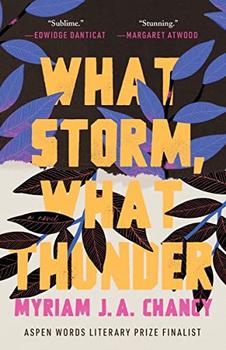Summary | Excerpt | Reviews | Beyond the Book | Readalikes | Genres & Themes | Author Bio

I thought about going to Saut d'Eau for a long time after Douz, to bury my mother's bones. I had never been but had always wanted to go. I thought about the stories that my husband, Lou, told me about the place. He went there just before we met, on the feast day in July. He asked the gods to bring him to someone like me. Not someone, he corrected himself, you. A soul mate. You, he said emphatically. Lou was a vodouisant all his days, made altars, offer-ings, participated in the feast days. I watched him without saying anything. I was a Catholic, and that was that. We never discussed our difference. Had he been here after what happened, happened, he would have danced with the mourners. I would have watched him. Lou's memories were my own. That's why it didn't bother me that once we were married, everyone took to calling me Ma Lou, echoing my constant references to him in my speech ("my Lou," "my Lou," I always said, as I still do, as if everything he told me were sacred and true; I wanted to believe that this was so). Every-one still calls me by his name, though Lou is long gone. After what happened, happened, it seemed to me then that it would be best to believe in gods that had not harmed me. Lou's gods. My mother's gods. Being sent to Catholic school early on severed me from them, even if I was only to become a market woman. At least I could read, count, and pray the catechism. I thought this made me lucky, but in other ways, it made me poor, like a pocket turned inside out, empty of coins.
My Lou had told me about the mapou cut down when the priest and a parish official stationed at Saut d'Eau were told that Ezili Wèdo, goddess of the waters, had made a shimmering apparition. Saut d'Eau was made up of two waterfalls and it was said that the second belonged to Damballah, the serpent god, giver of all life. The priest had the tree cut down, but the gods remained. That priest later lost both his legs in a freak accident. The police captain who had overseen the cutting down of the tree temporarily lost his mind. His faculties returned when he went into the waterfalls and asked for forgiveness. Now, everyone goes to the falls. Even I went, some two years ago, when I could begin to stand on my own two legs, move forward again, to cleanse the bones.
Before going, I thought a long time about the priest who'd lost his legs. Thought about the boy in the camp whose leg they'd cut off, whose mother had lost her hold on reality. Were they being punished for something? For not believing? But I could not be-lieve in gods that would punish the helpless. No. The earth had buckled and, in that movement, all that was not in its place fell upon the earth's children, upon the blameless as well as the guilty, without discrimination. It wasn't the boy who'd lost his leg, who was guilty, it was the rest of us who looked away from people like him, people who could have been us, lame, stumbling, afraid to go out of their houses in the light of day for fear of what could happen next. We'd lost our legs—sea legs, land legs, the ability to stand up for ourselves. I needed to cleanse the bones myself, to put all this behind me, return to the land, to my mother's land, remember everything, and forget the last two years of death be-getting death. But, for some time, before going to the waterfalls, I did not know where to start. How to rise again and set out. I am just an old market woman. A relic.
Yes, yes, me, Ma Lou, I admit, finally, that these bones of mine are old, worn out, fragile like the eggs I take to market that everyone wants, even the Dominicans. I never thought I would see the day that Dominicans would want anything we produced for ourselves.
But all they really want is to sell us their good-for-nothing eggs produced in factories. My eggs are warm from being dropped from the hens' insides. That's how fresh they are. That fresh.
Fresh like Jonas, who used to count his steps all over the market. Counted how many of everything I had to sell, how much I made with every sale. Counted the eggs I had, to see how many his family might purchase. They were five all together. Not the poorest. Not the richest. Just counting their pennies like all of us, counting and putting them away when there weren't enough to buy what they wanted. "Don't worry," I told him, when he would come to me with his fingers filled with grimy folds of paper, our useless gouds. "Don't worry," I'd say. "You save, and one day you'll have enough to purchase the whole dozen! For you, and for your family, the whole carton just for you." He would smile when I said that, be less embarrassed if that day he had been sent to purchase two or three eggs, sometimes only one. He came, that day, to get one egg for his mother, but he never reached home.
Excerpted from What Storm, What Thunder by Myriam J Chancy . Copyright © 2021 by Myriam J Chancy . Excerpted by permission of Tin House Books. All rights reserved. No part of this excerpt may be reproduced or reprinted without permission in writing from the publisher.
Your guide toexceptional books
BookBrowse seeks out and recommends the best in contemporary fiction and nonfiction—books that not only engage and entertain but also deepen our understanding of ourselves and the world around us.